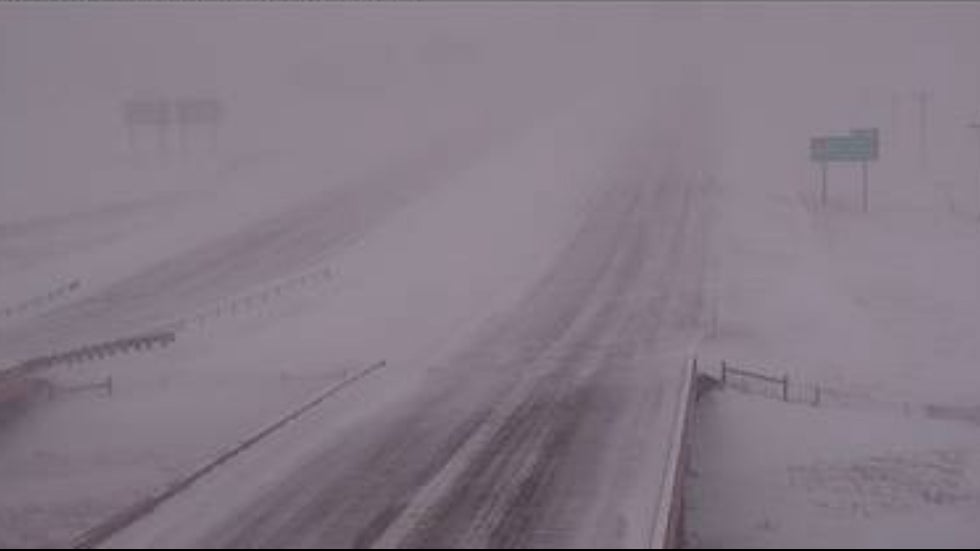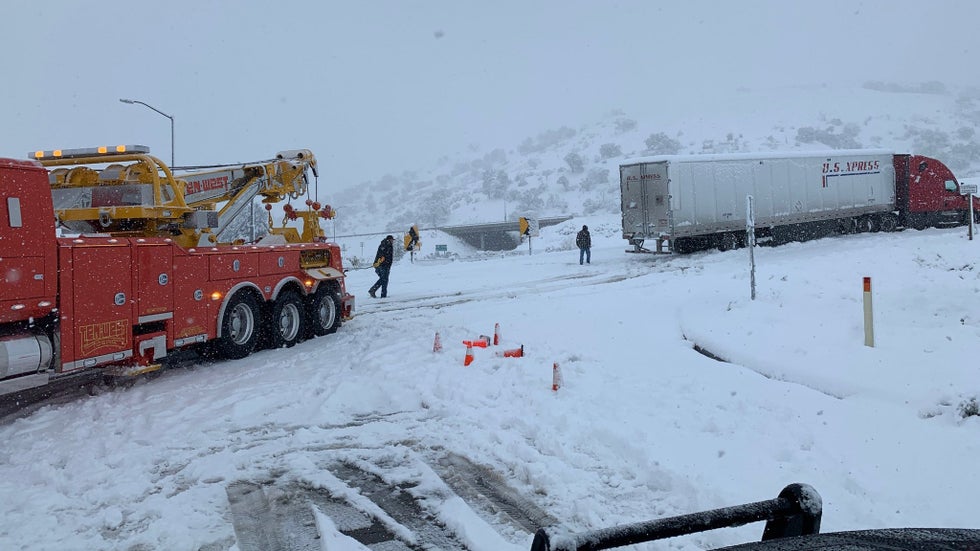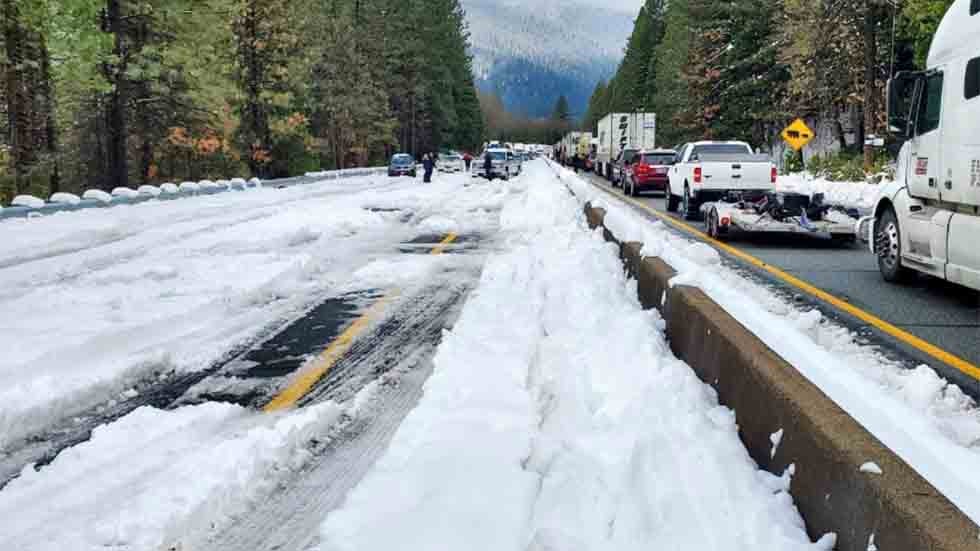
A winter storm has snarled holiday traffic in parts of the Plains and Midwest after closing roads in the West earlier this week and has caused a town in Arizona to declare an emergency.
One person was killed in a rollover accident near Cavour, South Dakota, or just northwest of Sioux Falls, early Friday morning. The pickup truck lost control on an ice covered road and went into the a ditch and rolled. Both people in the truck had to be removed from the truck by authorities, but neither were wearing seat belts, according to KELO.
People were advised not to travel in much of western South Dakota. Rapid City, South Dakota, canceled its Festival of Lights Parade scheduled for Saturday evening due to the high winds, and much of the parade route had not been plowed, KELO reported.
The Rapid City, South Dakota, airport closed Saturday afternoon after visibility dropped so low that crews were unable to plow and use equipment.
In Minnesota, two lanes of I-94 near Moorhead was closed Saturday afternoon following a multi-vehicle accident involving at least one semitrailer.
Farther east, the city of Duluth, Minnesota, issued a "no travel advisory" beginning Saturday afternoon, according to the Associated Press. The National Weather Service reported blizzard conditions at the head of Lake Superior with snow falling at a rate of 1 inch per hour and winds gusting above 50 mph. NWS said huge waves were crashing onshore causing lake shore flooding.
Strong winds and blowing snow created dangerous travel conditions in parts of western Nebraska and portions of Interstate 80 are closed as of Saturday afternoon Both directions of I-80 are closed from the Wyoming/Nebraska state line to Sidney.
Travel across the Nebraska panhandle was ill-advised, and in fact, the Highway Patrol said it was closed early Saturday afternoon.
Portions of I-80 in Wyoming are also closed from the Nebraska border to east of Cheyenne. No unnecessary travel is recommended in much of eastern Wyoming.
Travel is also discouraged in parts of Colorado as blowing snow and gusty winds have closed some roads as of Saturday afternoon, including Interstate 25 north of Fort Collins, Highway 93 between Boulder and Golden, as well as Highway 287 and Highway 85 near the Wyoming border.
Flight Aware listed more than 100 canceled flights and nearly 240 delayed flights at Denver International by early Saturday afternoon.
Breckenridge Ski Resort, the Arapahoe Basin and the Loveland ski area closed a handful of lifts due to high winds Saturday. The Eldora Ski Area was closed due to extreme winds.
Western Impacts
Tusayan, Arizona, declared a state of emergency due to heavy snow and lack of electricity Friday. Tusayan is located near the Grand Canyon National Park where over a foot of snow has been measured.

A shelter has been setup in the Grand Canyon National Park to assist the more than 1,000 people who have not had heat or power since early Friday. Roads are reported to be impassable and there are fuel shortages.
Parts of Interstate 40 and Interstate 17 were closed south of Flagstaff, Arizona, in both directions early Friday due to heavy snow in the higher elevations, according to the Arizona Department of Transportation. Several other roads were closed Friday morning in northern Arizona due to snow. The interstates were reopened midday Friday.
The National Weather Service noted Friday morning that travel was not recommended due to the heavy and blowing snow through at least midday. The Flagstaff area reported 8 to 12 inches of snowfall as of early Friday, with 15 inches measured at the Grand Canyon (South Rim).
In California, a portion of Interstate 5 from Grapevine to Castaic through Tejon Pass closed Thursday morning as heavy snow sweeps through the higher elevations. Snow gates were opened on I-5 near Santa Clarita to force northbound cars back southbound and down in elevation. Southbound lanes fully reopened Thursday afternoon. Several other major routes through Southern California are also closed.
The unusually intense winter storm downed trees, knocked out power and closed highways in parts of California Wednesday.
Motorists on Interstate 5 in Northern California reported being stuck on the road for hours and some spent the night in their cars, The Associated Press reported.

Christina Williams of Portland, Oregon, told the AP that it took her and her 13-year-son 17 hours to reach Redding, California, a journey that would normally take 10 hours.
Williams told the AP she and other stranded drivers used weather-related hashtags to connect on the social media platform Twitter and share information on road conditions. Williams described “spin-outs everywhere” and abandoned trucks.
"There were spin-outs everywhere, there were trucks that were abandoned and every time we stopped and started moving again, there were people who couldn't start moving again," she said. "Every time we stopped I was like, is this it? Are we going to be here overnight?"
About 100 miles of Interstate 5 between Yreka and Redding near the Oregon border was closed Tuesday night and into early Wednesday morning due to multiple vehicle spinouts, according to the California Department of Transportation. The southbound lanes reopened Wednesday morning. The northbound lanes reopened heading from Redding, California, all the way to the Oregon border Wednesday evening.
Authorities were working to remove "the extremely large number of vehicles" off the road.
"Those vehicles must be removed in order to get traffic flowing normally and the road plowed," Caltrans tweeted earlier in the day.
The southbound portion of the interstate was also shut down from Ashland, Oregon, due to the conditions in Northern California, but has reopened.
The westbound lanes of Interstate 80 between Truckee and Nyack were also closed Wednesday morning due to multiple spinouts, the California Highway Patrol said. The roadway later reopened to passenger vehicles only.
The Placer County Sheriff's Office posted video of whiteout conditions in North Lake Tahoe.
Several other state highways in Northern California were closed or down to one lane overnight and into Wednesday morning due to snow, ice or trees blocking the roadway, Caltrans said. Highway 20 in Nevada County was closed near the intersection of I-80 due to whiteout conditions and excessive snow, and Highway 49 was closed between Downieville and Sattley in Sierra County.
Winter storm warnings were in effect across much of the region. The National Weather Service in Sacramento said travel was highly discouraged. The NWS advised travelers to be prepared for major delays and near-whiteout conditions in some areas. The worst impacts were expected today across the northern Sierra Nevada.
"The timing is unfortunate for holiday travel because it's going to have a lot of wintry impacts," Kevin Durphee, a meteorologist with the National Weather Service, told KFSN-TV.
The NWS in Eureka warned that rain and hail were making roads slippery.
More than 76,000 homes and businesses were without power in California Wednesday morning, according to PowerOutage.us. Many of the outages were caused by high winds.
The storm met the criteria for a bomb cyclone as it moved toward the coasts of Northern California and southern Oregon on Tuesday, meaning its pressure dropped rapidly. The Weather Channel has named the system Winter Storm Ezekiel.
The storm's impacts started Tuesday and continued overnight, with snow, rain and heavy winds.
Authorities asked travelers to practice care when driving and check road conditions before heading out.
"There's going to be a lot of extra vehicles on the roadway," Shasta Tollefson with the California Highway Patrol told KFSN. "Give yourself plenty of time when you are heading out the door, and if you have a normal four-hour travel time, make sure that you give yourself six hours."
The Weather Company’s primary journalistic mission is to report on breaking weather news, the environment and the importance of science to our lives. This story does not necessarily represent the position of our parent company, IBM.
The Weather Company’s primary journalistic mission is to report on breaking weather news, the environment and the importance of science to our lives. This story does not necessarily represent the position of our parent company, IBM.

No comments:
Post a Comment